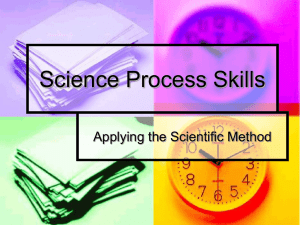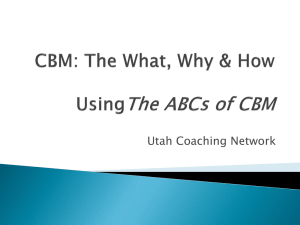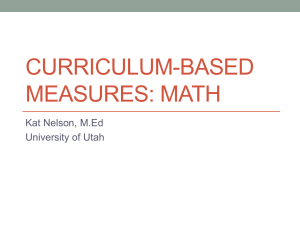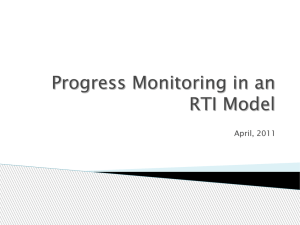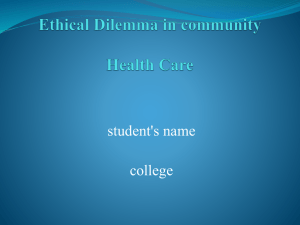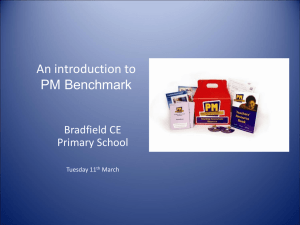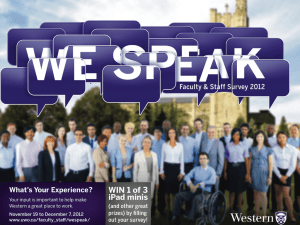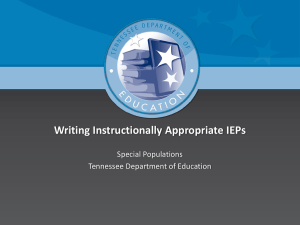Collins Part I. - People Server at UNCW
advertisement
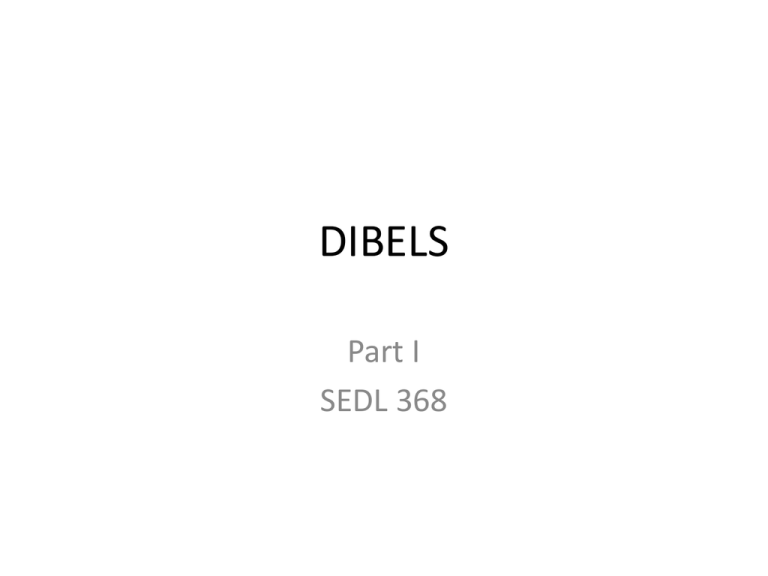
DIBELS Part I SEDL 368 • To access the materials, you will need to go to https://www.dibels.org/next/index.php • Download the booklet for the grade level of the student you will be tutoring (after placements have been finalized) The Basics of CBM • Purpose – ___________________ – Benchmark Assessment : Universal screening of ____ students • ____times / year – Progress Monitoring: Formative assessment of the effectiveness of _______________ • More frequent – _____________benchmarks • Not all students The Basics of CBM • CBM monitors student progress throughout the school year • Students are given reading ________ at regular intervals • _________, _________, _________ • Teachers use student data to quantify shortand long-term goals that will meet end-ofyear goals The Basics of CBM • CBM tests are brief and easy to administer • All tests are different, but assess the ____________and the same _______ level • CBM is tracking progress toward the ___________ • CBM scores are _________ for teachers to use to make decisions about instructional programs and teaching methods for each student CBM Research • CBM research has been conducted over the past __________ • Research has demonstrated that when teachers use CBM for instructional decision making: – Students learn more – _________________improves – Students are more aware of their __________ Steps to Conducting CBM • Step 1: How to Place Students in a Reading CBM Task for Progress Monitoring • Step 2: How to Identify the Level for Material for Monitoring Progress • Step 3: How to Administer and Score Reading CBM • Step 4: How to Graph Scores Steps to Conducting CBM • Step 5: How to Set Ambitious Goals • Step 6: How to Apply Decision Rules to Graphed Scores to Know When to Revise Programs and Increase Goals • Step 7: How to Use the CBM Database to Qualitatively to Describe Students’ Strengths and Weaknesses Step 1: How to Place Students in a Reading CBM Task – Benchmark • Benchmarks – Complete 3 times/year (Fall – Sept., Winter – Jan., Spring – May) • Help track progress toward end goal • ________________may need only benchmarks • Always benchmark _______________of the student Step 1: How to Place Students in a Reading CBM Task – Progress Monitoring • Progress Monitoring probes – may be administered weekly, bi-weekly, or monthly • Frequency of administration determined by __________ of the student • Help track progress toward end goal • May progress monitor on a ________grade level (e.g., 6th grader reading on a 3rd grade level) Step 1: How to Place Students in a Reading CBM Task • At Kindergarten – ______________ (Benchmark) – _______________(Benchmark & Progress Monitor) Kindergarten Benchmark Booklet Kindergarten Progress Monitoring Booklet DIBELS Timeline Step 1: How to Place Students in a Reading CBM Task • At Grade 1 – ______________(Benchmark) – Phoneme Segmentation Fluency(Benchmark & Progress Monitor) – ________________ (Benchmark & Progress Monitor) – Oral Reading Fluency (Benchmark & Progress Monitoring) First Grade Benchmark Booklet Step 1: How to Place Students in a Reading CBM Task • At Grade 2 – Nonsense Word Fluency (Benchmark & Progress Monitor) – __________________ (Benchmark & Progress Monitoring) Second Grade Benchmark Booklet Step 1: How to Place Students in a Reading CBM Task • At Grades 3- 6 – Oral Reading Fluency (Benchmark & Progress Monitor) – __________________(Benchmark & Progress Monitor) Third Grade Benchmark Booklet Third Grade ORF Third Grade DAZE Step 2: How to Identify the Level of Material for Monitoring Progress • Generally, students use the CBM materials prepared for their grade level • However, some students may need to read from a different grade level if they are ______________ grade-level expectations • Benchmark on grade level – ALWAYS! • May progress monitor at lower level (ORF measures ONLY) Step 2: How to Identify the Level of Material for Monitoring Progress • Begin with the student’s actual grade level • Test “___________”to determine appropriate level • Monitor the skills areas targeted for instruction (i.e., where the student shows weakness) Step 2: How to Identify the Level of Material for Monitoring Progress Oral Reading Fluency Growth Rates (Fuchs et al. 1993) Grade Realistic Ambitious 1 2 WCM/week 2.5 WCM/week 2 1.5 2 3 1 1.5 4 .5 .65 5 .3 .65 MAZE .4 .85 Example • Fourth Grade: End of the year – 115/WCPM at the minimum to be at benchmark • Student is tested (3 probes) and reads 50 WCPM (median score) • 36 weeks in a school year • Student should gain ______WCPM/week • _________= gain of _____ words correct • ______ + _____ = ____WCPM • Is this the correct grade level? Off-grade Level Progress Monitoring • When progress monitoring off grade level, the benchmark goal should try to be reached in ____________________ • For example, a 4th grader who is progress monitored on 3rd grade level DORF should be targeted for benchmark (100 WCPM) in the _____________ of the school year rather than the end
